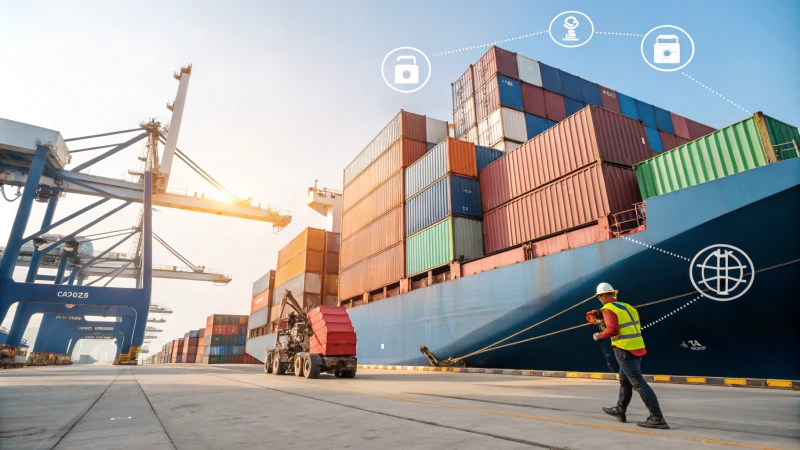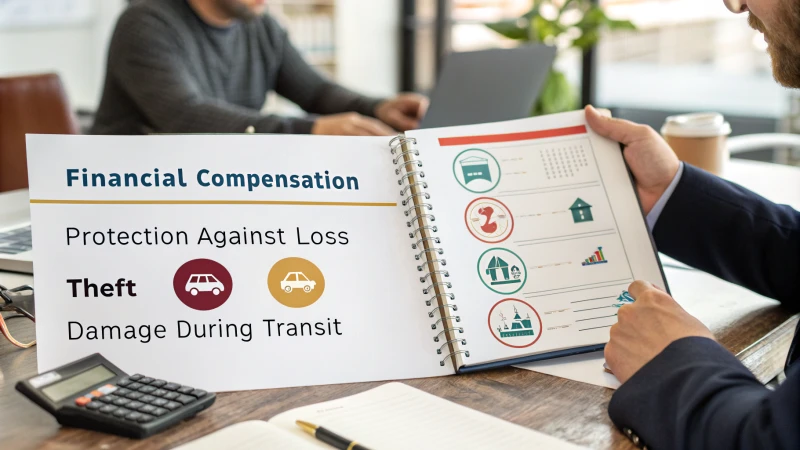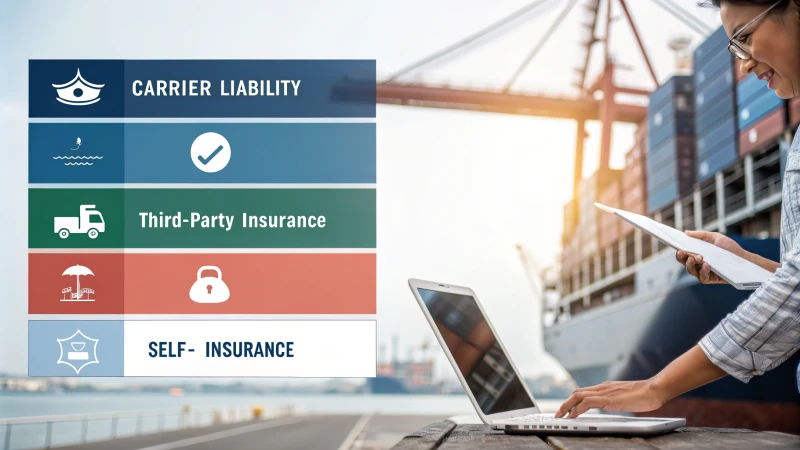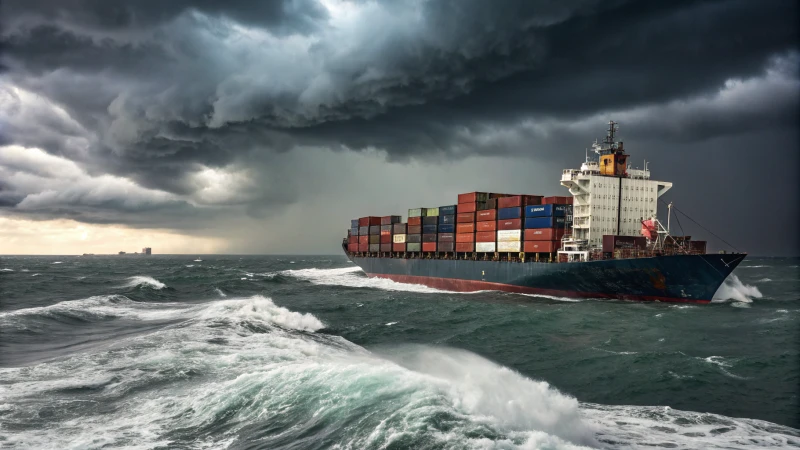Ever lost sleep worrying about your shipment's journey? Shipping insurance might be your peace of mind.
Shipping insurance is a safety net that offers compensation if goods are lost, stolen, or damaged during transit. Provided by shipping companies or third-party insurers, it protects sellers and buyers from financial losses.
I remember the first time I shipped a high-value order without insurance. The anxiety was real! Understanding how shipping insurance works has since become a game-changer for my business. Not only does it offer peace of mind, but it also shields my financials from unexpected losses. Let’s dive into why securing your shipments with insurance is not just a smart choice but an essential one for anyone in the trade game. Whether you're new to shipping or a seasoned pro like me, knowing your options can save you from potential headaches and financial setbacks.
Shipping insurance covers damage during transit.True
Shipping insurance compensates for loss, theft, or damage to goods.
Shipping insurance is mandatory for all shipments.False
Shipping insurance is optional, not mandatory, for shipments.
How Does Shipping Insurance Work?
Ever had that sinking feeling when waiting for a shipment, wondering if it'll arrive safely? Shipping insurance might just be your peace of mind.
Shipping insurance covers the loss, theft, or damage of goods during transit, offering compensation through carriers or third-party providers when mishaps occur.

What Does Shipping Insurance Cover?
Imagine receiving a box of shattered electronics instead of pristine gadgets; it’s a scenario I dread as much as any business owner. Shipping insurance is my safety net against such nightmares. Generally, it covers losses due to damage, theft, or loss during transit, and can extend to unforeseen events like natural disasters or accidents, depending on the insurance provider1 and policy terms.
- Damage: It’s like having a guarantee that damaged goods can be repaired or replaced without a financial hit.
- Loss: Think of it as protection against the complete disappearance of your shipment.
- Theft: Offers the security of financial recovery if items are stolen.
How to File a Claim?
I remember the first time I had to file a claim—it felt like navigating uncharted waters. But with prompt action and the right steps, the process is manageable. You need to notify the insurer quickly, within their specified period. Gather documentation like purchase invoices and photos of any damage.
| Steps | Details |
|---|---|
| Notify Insurer | Contact your insurer immediately after discovering an issue. |
| Document Damage | Take clear photos and gather all relevant documents. |
| Submit Claim Form | Fill out and submit the necessary forms to the insurer. |
Is Shipping Insurance Worth the Cost?
When I ship high-value or fragile items, I often ask myself if the insurance cost is justified. For expensive gadgets or delicate electronics, it’s often indispensable. Evaluating costs2 from different providers like USPS or FedEx helps me weigh its value against shipment risk.
- High-value Items: Essential for costly replacements.
- Fragile Goods: Crucial for items prone to damage.
- International Shipping: Provides peace of mind amidst complex logistics.
Industry Perspectives
Scrolling through Reddit3 and reading fellow eCommerce sellers’ experiences has been enlightening. Their stories reflect the varied necessity and effectiveness of shipping insurance.
Considerations often include:
- Cost vs. Risk: Balancing expense against potential loss.
- Reliability of Carriers: Trust in carriers' handling of goods.
- Frequency of Issues: Past incidents influencing decision-making.
Whether it’s a small box or a full container, knowing your shipment is covered can make a world of difference. For me, it’s about ensuring that every gadget reaches its new home safely, just as I promised my customers.
Shipping insurance covers acts of war.True
Some shipping insurance policies cover acts of war, depending on terms.
Filing a claim requires only verbal notification.False
Claims need documentation like invoices and damage photos.
What Are the Benefits of Shipping Insurance?
Ever shipped something precious and worried about it getting lost or damaged? Shipping insurance might just be your peace of mind.
Shipping insurance is like a safety net, protecting your goods from loss, damage, or theft while they’re in transit. It offers financial compensation, which means that neither businesses nor buyers have to worry about the cost of replacing lost or damaged items, keeping trust and finances intact.

Financial Protection: A Safety Net for Your Goods
I still remember the first time I shipped a large order without insurance. I felt like I was sending my child out into the world without a jacket on a cold day. When you opt for shipping insurance, it's like having a warm coat for your goods—it covers financial losses if shipments are damaged or lost. Knowing that I’m protected gives me the peace of mind that’s priceless.
Building Trust with Customers
Imagine the delight of your customers when they realize their purchase is insured. This assurance isn't just a feature; it’s a trust builder. In e-commerce and wholesale, trust is the currency that buys customer loyalty. I've noticed an increase in repeat purchases when customers know their orders are insured.
Affordable Peace of Mind
The best part? Shipping insurance isn’t as expensive as you might think. I’ve compared rates from various providers, and they can be quite reasonable. Here’s a quick peek at what I found:
| Provider | Average Cost | Coverage Details |
|---|---|---|
| Provider A | 1% of item value | Covers all transit risks |
| Provider B | $2 per package | Limited to specific zones |
The key is to find a plan that fits your business needs.
Streamlined Claim Processes
When a shipment issue arises, the last thing I want is to be bogged down by red tape. Luckily, modern shipping insurance companies have streamlined their claim processes. This means quicker resolutions and reimbursements, keeping my business running smoothly without cash flow hiccups. Understanding claim processes4 can save you time and stress.
Customizable Coverage Options
Flexibility is crucial in business, and many insurers get that. They offer customizable coverage options, so I only pay for what I need based on my unique shipping requirements. This flexibility is especially helpful when dealing with different types of products, whether they’re delicate electronics or sturdy goods.
Competitive Edge in the Market
Offering insured shipments has given me a leg up on the competition. Customers tend to favor shopping where their purchases are protected. This not only increases sales but also fosters customer loyalty.
Conclusion Placeholder (Avoid conclusions)
Every shipping insurance policy comes with its own set of features. Evaluating these benefits in light of your specific business needs is vital for making informed decisions. Researching various providers5 will give you insights into what might work best for you.
Shipping insurance is always expensive.False
Shipping insurance is often cost-effective with competitive rates.
Insured shipments can increase customer loyalty.True
Insurance boosts buyer confidence, enhancing trust and retention.
How Much Does Shipping Insurance Cost?
Have you ever shipped something precious and worried about its safety until it arrived?
Shipping insurance usually costs between 1% and 5% of the package's declared value, influenced by factors like carrier choice, package value, and destination.

Factors Affecting Shipping Insurance Costs
Navigating the world of shipping insurance can feel like a game of chess. You’ve got to think ahead and know the rules. When I first started my business, I remember the anxiety of sending off my very first shipment, hoping it would reach its destination in one piece. Understanding the cost of shipping insurance was crucial for me.
Here's what I discovered: insurance costs generally hinge on a percentage of the declared value of your shipment. But that's not all; there are several other factors at play.
- Carrier: Each carrier comes with its own set of rules and rates. USPS6, for instance, is usually a go-to for domestic shipments because of its competitive rates. On the other hand, FedEx and UPS might offer different percentages based on what you're shipping and where it's going.
- Package Value: The more valuable your package, the more you might need to shell out for insurance. Some carriers have a sliding scale where the percentage actually decreases as your package value increases—something I found useful when shipping high-value electronics.
- Destination: Sending something internationally? Brace yourself for potentially higher fees due to risks like customs delays or the unpredictability of international handling.
| Carrier | Domestic Insurance | International Insurance |
|---|---|---|
| USPS | Starting at $2.10 | Varies with package value |
| FedEx | Typically 1-3% | Additional costs for high-risk areas |
| UPS | Similar to FedEx | Special rates apply for certain countries |
Additional Considerations
- Type of Goods: From my experience, anything fragile or high-risk is a bit like carrying eggs in a basket. You want to ensure they arrive safely, and that can mean higher insurance costs.
- Shipping Method: If you're opting for something like air freight, sometimes insurance is bundled into those premium costs—something I learned after a few costly mistakes.
- Third-party Providers: Companies like ShipCover7 might offer plans that better fit your needs, especially if you're looking for alternatives.
Understanding these factors8 has helped me estimate insurance costs accurately and make sure each shipment is worth insuring. For a business like mine, where timely and secure deliveries are the backbone, this knowledge is invaluable.
By considering all these variables, I've been able to manage logistics expenses efficiently and ensure that my shipments are protected without overspending. It's always wise to compare options across carriers and third-party providers to find the best fit for your specific needs.
USPS offers the lowest domestic insurance rates.True
USPS is noted for having lower rates for domestic shipments.
International insurance costs are lower than domestic.False
International shipments often have higher insurance fees due to risks.
What Are the Different Types of Shipping Insurance?
Remember the time you worried about your shipment arriving safely? Shipping insurance is your peace of mind.
Shipping insurance types include carrier liability, third-party insurance, and self-insurance. Each offers varying coverage levels and costs, catering to different business needs and risk management strategies.

Carrier Liability
You know that feeling when you think, "Is this enough protection for my goods?" Carrier liability might leave you with that question. It's the basic coverage most carriers offer, often calculated by the weight of your shipment rather than its true value. So, if something goes wrong, you might find the compensation doesn't quite match the loss, especially if you're shipping something valuable.
Third-Party Insurance
Then there's the time I decided to ship some high-end electronics—worth every penny for the peace of mind. That's when I turned to third-party insurance. Unlike carrier liability, these policies can be customized to cover the actual value of your goods. Whether you're shipping delicate gadgets or luxurious items, third-party insurance ensures they have that extra layer of protection.
Third-party policies9 are particularly useful for high-value shipments that require additional protection beyond standard carrier liability.
| Type | Coverage Level | Cost |
|---|---|---|
| Carrier Liability | Limited (weight-based) | Low |
| Third-Party Insurance | Full (value-based) | Moderate |
| Self-Insurance | Custom (business-managed) | Varies |
Self-Insurance
Sometimes, I like having control over things, which is why I considered self-insurance. By setting aside a reserve within the business, I could manage claims personally. It's a flexible option but requires careful planning to ensure I'm not caught off guard by unexpected losses.
International Coverage Considerations
Shipping across borders adds another layer of complexity. I remember poring over international regulations to avoid any unpleasant surprises with coverage gaps. Each region has its own rules, so doing a bit of homework on international insurance regulations10 can make a world of difference.
Personal vs. Commercial Policies
When shipping goods for personal versus commercial purposes, I've noticed a significant difference. Personal policies are typically straightforward, but commercial shipments require considering complex logistics and larger volumes. Tailoring commercial shipping options11 to fit these needs has been essential for my business's smooth operation.
Carrier liability covers the full value of goods.False
Carrier liability is weight-based, not value-based, offering limited coverage.
Third-party insurance is ideal for high-value shipments.True
Third-party insurance offers full value coverage, suitable for expensive items.
When Should You Consider Buying Shipping Insurance?
Ever shipped something precious and worried it might not make it in one piece? You're not alone. Let's talk about when shipping insurance could be your best friend.
Buying shipping insurance is wise when dealing with high-value items, unreliable carriers, or if your industry faces significant risks of damage or loss. Weigh the insurance cost against potential losses.

Key Scenarios for Purchasing Shipping Insurance
Alright, let's dive into this. Picture this: I'm sending out a batch of shiny new gadgets, each worth more than my monthly rent. That's when I start thinking seriously about shipping insurance. If you're shipping high-value items like electronics or jewelry, it's a no-brainer. These goodies are magnets for mishaps.
-
Value of Goods: It's simple math. If replacing an item costs more than the insurance, then it's a smart move. I remember when a friend of mine didn't insure his pricey shipment of electronics. One rough journey later, he was knee-deep in losses.
-
Carrier Reliability: Not all carriers are created equal. Sure, big names like FedEx and UPS have their act together, but others might not be as reliable. I often find myself scrolling through reviews on Reddit12 to get the scoop on a carrier's reputation before making a decision.
-
Shipping Destination: Sending stuff overseas? It’s like playing a game of telephone—so many hands involved, and something could easily get lost in translation. International shipments come with their own set of risks, so understanding customs can be crucial.
Here's a quick comparison table to help you assess when insurance might be needed:
| Factor | Consider Insurance? |
|---|---|
| High-Value Item | Yes |
| Unreliable Carrier | Yes |
| Complex Destination | Yes |
| Low-Value Item | No |
Industry-Specific Considerations
Different industries, different headaches! In fields like art or antiques, where fragility and rarity are key, insurance isn't just recommended—it's essential.
-
Fragile Items: Even if an item isn’t worth much financially, its sentimental value might be irreplaceable. I once shipped a family heirloom clock—thankfully insured—and it arrived with a crack. The compensation didn’t bring back the original beauty, but it softened the blow.
-
Seasonal Demand: Ah, peak season—the time when everyone’s shipping everything everywhere. It’s chaotic, and items can vanish into thin air. Checking out peak season advice on logistics forums13 can help me stay ahead.
Evaluating these scenarios will help you figure out if shipping insurance is the right call for your precious cargo.
Shipping insurance is essential for high-value items.True
High-value items are more susceptible to theft or damage, warranting insurance.
Low-value items always need shipping insurance.False
Insurance isn't cost-effective for low-value items as replacement costs are minimal.
Conclusion
Shipping insurance protects goods during transit from loss, theft, or damage, offering financial compensation and peace of mind for sellers and buyers alike.
-
Explore this link to understand the various coverage options available, ensuring your shipments are adequately protected. ↩
-
This link offers a comparative view of insurance costs among major carriers, helping you make informed decisions. ↩
-
Gain insights from community discussions about the effectiveness and necessity of shipping insurance. ↩
-
Learn about streamlined claim processes that expedite resolutions and reimbursement for insured shipments. ↩
-
Find reputable providers to ensure your shipments are adequately covered with tailored insurance solutions. ↩
-
Explore USPS's current rates for domestic and international shipping insurance, helping you determine potential costs for your packages. ↩
-
Discover alternative options for shipping insurance that may offer more competitive rates than traditional carriers. ↩
-
Gain insights into what determines shipping insurance fees and how these factors impact your overall logistics budget. ↩
-
Discover how third-party shipping insurance provides full coverage for valuable shipments beyond standard carrier liability. ↩
-
Understand the complexities of international shipping insurance to prevent coverage gaps in cross-border shipments. ↩
-
Learn about commercial shipping insurance options tailored for businesses with complex logistics needs. ↩
-
Explore community insights on carrier reliability to make informed choices about shipping insurance. ↩
-
Gain insight into seasonal logistics issues that may necessitate additional insurance coverage. ↩




